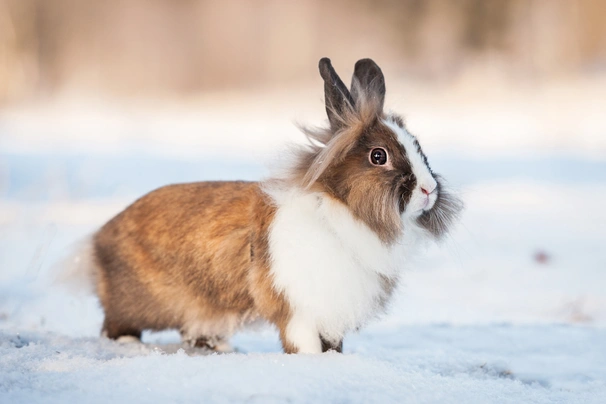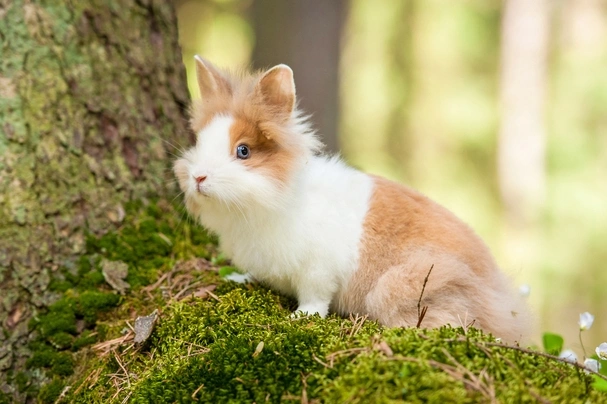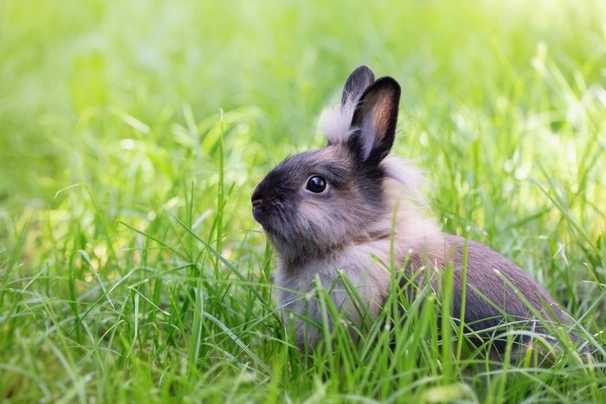Lionhead
Introduction of the Lionhead
The Lionhead is one of the newer breeds of domestic rabbit and is thought to have been developed after a genetic mutation resulted in an animal that displayed a luxuriant mane of hair around the head. Breeders thought this mane made the rabbit look like a male lion and the name stuck.
The Lionhead originated in Belgium and although experts seem unsure about the exact breeds that were put together to create it, it is becoming very popular as both a pet and show rabbit around the world.
History of the Lionhead
As mentioned, the Lionhead is the result of a genetic mutation that gave breeders a rabbit with a mane of longer fur surrounding the head. As this particular mutation was looked upon favourably by the original breeders, the mutation was ‘fixed’ using selective breeding.
The Lionhead mutation is the first major mutation seen in rabbit breeding since the appearance of the Satin in 1932 and unlike many other fur-related mutations, the Lionhead gene is dominant which means if a Lionhead breeds with a ‘normal’ rabbit, some of the kits will display the characteristic Lionhead ‘mane’, thus proliferating the breed.
There are many tales surrounding the emergence of the Lionhead breed – particularly around the types of rabbits that were put together to produce the Lionhead mutation. Many experts believe the breed started in Belgium and was the product of a cross between a Swiss Fox and a Belgian Dwarf, which created a long-haired dwarf. Other fanciers surmise that the Lionhead mutation occurred in a litter of pure Dwarf Angora animals and that the dominant Lionhead gene appeared more and more often in Angora litters. Whatever the correct version of events, it’s certainly true that the Lionhead began life in Europe and the Angora played an important role in the development of the breed.
Lionheads were imported into the UK and put to other small, long-haired breeds to create the Lionhead rabbit that we know and love today. It was recognised officially by the British Rabbit Council in 2002 and was accepted in all colourways and patterns. In the US the breed is still waiting to be accepted by the American Rabbit Breeders Association.
Appearance of the Lionhead
- Main colourways: Blue, black, lilac, white (with red and blue eyes), chinchilla, sable and agouti
- Average weight: 1.3 – 1.7 kg
Following the introduction of the Netherland Dwarf into the lines, the Lionhead is a small, compact, well-rounded frame, with a wide head which is held close to the body. The ears are short and held upright.
The Lionhead has soft, medium-length fur and the famous mane creates an upstanding ‘fringe’ around the head which runs around the neck, culminating in a bib of 5-7cm in length.
Because the breed is a genetic mutation, breeding Lionheads to meet the standard is extremely difficult. Animals that inherit two dominant genes will develop a ‘double mane’. When young, these rabbits will have normal fur with bare sides, chest and belly, but as they grow they will develop a mane that extends around the head, shoulders and down the back and chest. Many ‘double maned’ Lionheads can also grow lots of fur on the flanks and display tufts on the tops of the ears which is also considered a fault by the breed standard.
The Lionhead is accepted in all colourways including lilac, blue, sable, white, sable point, fox, squirrel, chinchilla, agouti, harlequin, frosted pearl and red.
Temperament of the Lionhead
The Lionhead positively craves attention and because of this usually makes a gentle, easy going pet that’s remarkably well-mannered. They can occasionally be timid, but are usually lively, like many of the smaller rabbit breeds. A gentle, consistent handler will win his trust and encourage him to show the fun, inquisitive side of his personality. Given the right circumstances, the Lionhead can be playful and outgoing and definitely needs plenty of room to charge around and have fun.
Despite their playful nature, the Lionhead is not recommended as a pet for children as they need careful management and may become frightened and aggressive if handled incorrectly. Some Lionheads may be aggressive regardless of how they are handled and it should be remembered that the Lionhead breed is still relatively new and is still undergoing development in order to rid lines of disagreeable traits such as aggression and timidity.
Health of the Lionhead
Like most rabbits, Lionheads are susceptible to dental problems. Rabbit teeth grow continuously and because of this they must be offered a diet that’s high in fibrous vegetables and roughage such as good-quality hay that will help wear the teeth down and keep overgrown molars and enamel spurs at bay. Overgrown teeth and spurs can cause many other problems including abscesses which, if allowed to go undetected, can lead to serious complications. If a rabbit’s teeth are in poor condition it could also affect his ability to eat properly.
Rabbits digestive systems are also very delicate so careful attention should be paid to his diet. He should be wormed twice a year and he should also be treated to prevent fleas and ticks. If you have a female Lionhead you should consider spaying in order to prevent uterine cancer, which is common in many rabbit breeds.
Care should be taken in the summer months to prevent your rabbit becoming a victim of fly strike. If he is allowed outside in warm weather, or if he lives outdoors, flies will be attracted to any areas that are soiled with faeces or urine. If these areas are actually on your rabbit he could become a victim of fly strike, where flies will lay their eggs in or around the rectum of your pet. Emerging maggots can cause damage to skin of the rabbit and leave him with open wounds that can easily become infected. It’s important that your rabbit is kept clean and dry and flies are kept away from him and his living areas.
Caring for the Lionhead
Diet is the biggest consideration for any rabbit. He should be provided with access to green, leafy, fibrous vegetables such as cabbage, kale, lettuce, dandelions and nettles, as well as good quality hay and rabbit pellets. Any change to his diet should be made gradually to avoid any tummy upsets. Fresh, clean drinking water should always be available too.
If he’s going to live outdoors his hutch should be fully waterproof with a cover over the front to keep out the worst of the weather. It shouldn’t be placed in windy corners or areas exposed to full sun. It should be big enough to allow him to stand comfortably on his hind legs and to hop three times from one end to the other. The hutch should have a covered area where he can rest or get out of the wind and rain and it should be lined with absorbent material such as wood shavings. Any droppings and urine should be removed daily and all bedding must be removed and replaced weekly. The hutch can also be disinfected during clean out, although the rabbit should not be put back in his hutch until it’s completely dry.
If he’s going to live indoors he should be provided with a specially designed indoor cage and he should also be shown how to use a litter tray (this is easier than it sounds!). It’s also wise to remove anything that you might not want chewing – particularly cables and wires.

Stunning double mained lionheads ready now
£60

Double Maned Lionhead rabbits for sale
£45



